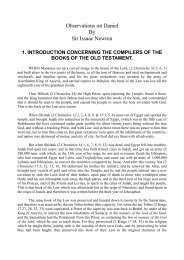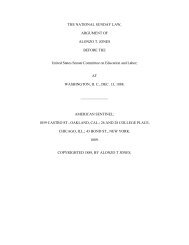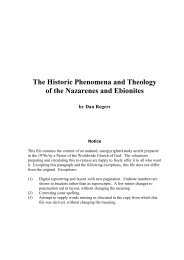Legends of the Shawangunk2 JR.pdf - Friends of the Sabbath ...
Legends of the Shawangunk2 JR.pdf - Friends of the Sabbath ...
Legends of the Shawangunk2 JR.pdf - Friends of the Sabbath ...
Create successful ePaper yourself
Turn your PDF publications into a flip-book with our unique Google optimized e-Paper software.
“Gross” Hardenburgh. 137<br />
The death <strong>of</strong> Nancy Ryerson antedated that <strong>of</strong> her husband, and several <strong>of</strong> her<br />
children died unmarried; consequently <strong>the</strong> purpose <strong>of</strong> <strong>the</strong> fa<strong>the</strong>r was defeated, <strong>the</strong><br />
dissipated son inheriting <strong>the</strong> property <strong>of</strong> his deceased children. Gross Hardenburgh is<br />
said to have made <strong>the</strong> impious and heartless boast, that while his fa<strong>the</strong>r disinherited him,<br />
<strong>the</strong> Almighty it made all right by removing some <strong>of</strong> his own children. Such were <strong>the</strong><br />
antecedents <strong>of</strong> <strong>the</strong> man who was about to enter upon <strong>the</strong> work <strong>of</strong> evicting <strong>the</strong> settlers <strong>of</strong><br />
Sullivan. Little hope <strong>of</strong> mercy could any expect who were in his power.<br />
His controversy with his fa<strong>the</strong>r, his wife, his children, and <strong>the</strong> settlers <strong>of</strong> <strong>the</strong><br />
Neversink valley, had <strong>the</strong> effect <strong>of</strong> arousing a spirit <strong>of</strong> antagonism against him which<br />
time has scarcely s<strong>of</strong>tened, nor <strong>the</strong> teachings <strong>of</strong> charity perceptibly modified; few, even at<br />
this late day, choosing to say a word in his defense. He hated his family, and defied <strong>the</strong><br />
world. When he at last met his fate <strong>the</strong>re was not one left to mourn his loss; while many<br />
could not conceal <strong>the</strong>ir joy that his presence would no longer afflict <strong>the</strong>m.<br />
Before proceeding to extreme measures, Hardenburgh made a general <strong>of</strong>fer <strong>of</strong> one<br />
hundred acres <strong>of</strong> wild upland to each settler <strong>of</strong> <strong>the</strong> disputed territory for his<br />
improvements; but <strong>the</strong> occupants <strong>of</strong> <strong>the</strong> valley met his overtures with defiance. They had<br />
purchased <strong>the</strong> bottom lands <strong>of</strong> <strong>the</strong> Neversink in good faith, and were not disposed to yield<br />
up <strong>the</strong>ir improvements for wild mountain lands. They believed that Hardenburgh’s claim<br />
was fraudulent; or should it prove o<strong>the</strong>rwise, that <strong>the</strong> state would provide a remedy for<br />
<strong>the</strong> difficulty.<br />
Meanwhile, finding that his <strong>of</strong>fers were refused. Hardenburgh instituted suits <strong>of</strong><br />
ejectment against several <strong>of</strong> <strong>the</strong> settlers. Without waiting, however, for <strong>the</strong> courts to<br />
decide <strong>the</strong> question, he took <strong>the</strong> law into his own hands, and commenced <strong>the</strong> work <strong>of</strong><br />
seizing upon property and forcibly dispossessing <strong>the</strong> inhabitants. In <strong>the</strong> fall <strong>of</strong> 1806 he<br />
took six hundred bushels <strong>of</strong> grain in bulk, and all <strong>the</strong> growing crops, from James Brush<br />
and his three sons. The grain was placed in a grist-mill owned by himself, which stood<br />
on <strong>the</strong> site <strong>of</strong> <strong>the</strong> Hardenburgh saw-mill.* Gross also owned a house and barn in <strong>the</strong><br />
vicinity, and his son also owned some buildings <strong>the</strong>re. Among <strong>the</strong> latter was a barn in<br />
which was stored three hundred bushels <strong>of</strong> grain, which had been forcibly taken from <strong>the</strong><br />
settlers.<br />
It was not long before <strong>the</strong> mill, houses, and barns, were all destroyed by fire. Under<br />
such circumstances it was strongly suspected that <strong>the</strong> dissatisfaction <strong>of</strong> <strong>the</strong> settlers had an<br />
intimate connection with <strong>the</strong> burning <strong>of</strong> <strong>the</strong> property, and that a terrible vengeance<br />
awaited upon <strong>the</strong> patentee. Some <strong>of</strong> <strong>the</strong> Hardenburgh family were <strong>the</strong>n residing near by,<br />
but became so alarmed that <strong>the</strong>y soon left <strong>the</strong> neighborhood.<br />
During that same year it is asserted that Hardenburgh forcibly set <strong>the</strong> family <strong>of</strong> James<br />
Brush out <strong>of</strong> doors, and kicked Mrs. Brush as she went, though<br />
* Quinlan’s “History <strong>of</strong> Sullivan.”
















